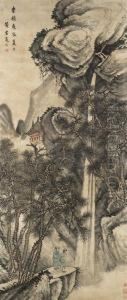Huang Zongyan Paintings
Huang Zongyan, also known as Huang Zongxi, was a Chinese philosopher, historian, and writer during the Ming and early Qing dynasties. Born on September 24, 1610, in Yuyao, Zhejiang Province, he was a prominent figure in Chinese intellectual history and is best known for his critical evaluation of the imperial system and his advocacy for constitutional monarchy. His father, Huang Zunsu, was also a renowned scholar-official and a victim of political persecution, which deeply influenced Huang Zongyan's outlook on politics and government.
Huang Zongyan's life spanned a tumultuous period in Chinese history, marked by the fall of the Ming dynasty and the establishment of the Qing dynasty by the Manchus. Living through this period of political upheaval, he was deeply involved in the resistance against the Qing and supported the restoration of the Ming dynasty. After the ultimate failure of these efforts, Huang turned away from politics and focused on his scholarly work.
In his writings, Huang Zongyan was critical of the autocratic nature of imperial rule and the corruption that it engendered. He advocated for a system in which the monarch's power would be limited by a constitution and where officials would be chosen based on merit rather than birthright. His most significant work, 'Waiting for the Dawn' (Mingyi daifang lu), was a profound critique of despotism and a call for political reform. This text was not published until after his death, as its content was considered highly subversive at the time.
Huang Zongyan was also an accomplished historian. His historical writings include the 'Comprehensive Mirror for Aid in Government' (Zizhi Tongjian Gangmu), which was a continuation of Sima Guang's 'Comprehensive Mirror in Aid of Governance' (Zizhi Tongjian), a monumental history of China from the earliest times up to the Song dynasty. In addition to his political and historical works, Huang was also known for his essays on literature and philosophy.
Despite his significant contributions to Chinese thought, Huang Zongyan lived a life of relative obscurity, and his works gained greater recognition posthumously. He passed away in 1695, but his ideas on constitutional government and his critiques of despotism would go on to influence later generations of Chinese reformers and revolutionaries. Huang Zongyan's legacy is that of a thinker who dared to envision a political system that could ensure justice and good governance beyond the reach of autocracy.
